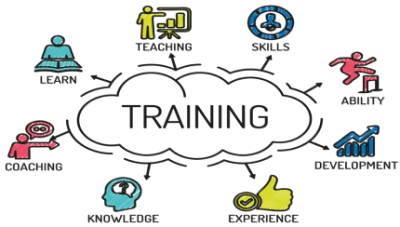
- Training and Development
- What is Training and Development?
- Enhances Employee Skills and Knowledge
- Increases Employee Engagement
- Boosts Employee Performance
- Improves Employee Retention
- Fosters Innovation
- Strengthens Company Culture
- Increases Job Satisfaction
- Conclusion
Training and Development
In today’s rapidly evolving business world, organizations need to stay competitive and adaptable to meet new challenges. One of the most powerful ways to achieve this is through training and development programs. Investing in the growth and improvement of employees is crucial for any organization that wants to remain relevant and successful in the marketplace. Training and development (T&D) offer significant advantages to both employees and the organizations they work for Placement and Softskills Training . These programs can include anything from professional skills workshops to leadership development courses and everything in between. This blog post will explore the importance of training and development and explain the 10 key benefits that make these programs indispensable for any thriving organization.
What is Training and Development?
Training refers to the process of improving the technical skills and knowledge of employees to help them perform their current roles effectively. It typically focuses on teaching specific competencies that are necessary for employees to succeed in their jobs, such as using certain software or learning best practices, all of which are outlined in a comprehensive Guide to Training and Development.

Development, on the other hand, is a broader and long-term approach. It is aimed at enhancing an employee’s overall capabilities and potential for future roles, often focusing on leadership, management skills, and career growth. Both training and development are essential for the continuous growth of employees and businesses alike.
To Explore Soft Skill in Depth, Check Out Our Comprehensive Soft Skill Certification Training To Gain Insights From Our Experts!
Enhances Employee Skills and Knowledge
The most obvious benefit of training and development is the enhancement of employee skills and knowledge. Whether it’s learning a new technology, refining communication abilities, or gaining expertise in a particular area, training helps employees become more skilled and efficient in their roles.As industries evolve, employees must stay updated on new trends, tools, and techniques to remain competitive, which is why exploring High-Demand Career Opportunities becomes essential for long-term success. Training programs ensure that employees have the necessary skills to meet the demands of their current jobs and prepare them for any future roles they may take on.
Example: A customer service representative learning new software to provide better support or an HR manager attending leadership training to handle larger teams.
Are You Interested in Learning More About Soft Skill ? Sign Up For Our Soft Skill Certification Training Today!
Increases Employee Engagement
When employees are given the opportunity to learn new skills and grow professionally, Increases Employee Engagement they feel more engaged with their work. Employee engagement is directly correlated with the level of investment an organization makes in their professional development, which can be enhanced through Smart Ways to Learning. Training programs demonstrate that the company values its workforce and is committed to helping them succeed. This creates a positive work environment where employees are more likely to take initiative, be proactive, and remain invested in their jobs.
Example: Companies that offer training opportunities often see higher levels of employee satisfaction and motivation, which leads to greater overall productivity.
Boosts Employee Performance
Regular training helps employees stay sharp and maintain high levels of performance. Whether it’s learning about new best practices or improving specific aspects of their job, training ensures that employees are equipped to do their best work, a principle reinforced by Top Leadership Theories. By refining job-specific skills and fostering the ability to handle complex tasks, employees become more productive and efficient. This directly impacts the organization’s bottom line by increasing output and reducing errors.
Example: Sales teams trained on advanced sales techniques are often able to close more deals and hit higher targets.
Improves Employee Retention
- Enhances Job Satisfaction: Employees who receive regular training feel more competent and confident in their roles, leading to greater job satisfaction and loyalty.
- Career Growth Opportunities: Providing development programs shows a clear path for career advancement, motivating employees to stay longer with the organization Softskills Training .
- Boosts Engagement and Motivation: Well-trained employees are more engaged, productive, and aligned with organizational goals, reducing the likelihood of turnover.
- Builds Organizational Commitment: Investing in employee growth demonstrates that the organization values its workforce, fostering a sense of belonging and long-term commitment.
Are You Considering Pursuing a Master’s Degree in Soft Skill? Enroll in the Soft Skill Masters Program Training Course Today!
Fosters Innovation
- Encourages Creative Thinking: Training programs expose employees to new ideas, tools, and techniques, inspiring them to think outside the box.
- Enhances Problem-Solving Skills: Skill development equips employees to approach challenges with innovative solutions and strategic thinking.
- Promotes Knowledge Sharing: Collaborative learning environments encourage employees to share insights, sparking collective creativity and innovative approaches.
- Supports Adoption of New Technologies: Continuous training familiarizes employees with emerging tools and trends, enabling them to implement innovative processes and practices effectively.
- Example: A company that trains its marketing team on the latest digital marketing strategies is more likely to come up with innovative campaigns that capture new customer segments.

Strengthens Company Culture
- Aligns Employees with Organizational Values: Training programs communicate the company’s mission, vision, and values, ensuring employees understand and embrace the culture.
- Promotes Collaboration and Teamwork: Development initiatives, such as workshops and group projects, foster strong interpersonal relationships and a sense of community.
- Encourages Continuous Learning: A culture that values learning motivates employees to grow professionally, reinforcing a positive and proactive workplace environment.
- Builds Employee Engagement and Loyalty: Investing in training demonstrates that the organization cares about its workforce, strengthening trust and commitment to the company.
Are You Preparing for Soft Skill Jobs? Check Out ACTE’s Soft Skill Interview Questions & Answer to Boost Your Preparation!
Increases Job Satisfaction
Employees who feel that they are growing and developing professionally are generally more satisfied with their jobs. Training and development programs provide employees with the skills and confidence they need to excel in their roles, leading to increased job satisfaction and opening pathways to Explore Non-Coding IT Jobs that match their evolving skill sets. Employees are more likely to stay motivated, focused, Increases Job Satisfaction Strengthens and is fulfilled when they feel that their work contributes to their long-term career goals.
Example: Employees who attend leadership workshops or skill-building seminars are often more confident in their abilities, which boosts overall satisfaction.
Conclusion
In conclusion, the importance of training and development cannot be overstated. These programs offer a wide array of benefits that not only improve individual employee performance but also contribute to the overall success of an organization. From enhancing skills and boosting engagement to fostering innovation and reducing turnover, training and development Softskills Training is essential for maintaining a competitive edge in today’s fast-paced business environment. Investing in employee training and development is an investment in the company’s future, driving growth, improving efficiency, and ensuring the satisfaction and retention of talented employees. Organizations that prioritize T&D create a culture of continuous learning and progress,Strengthens positioning themselves for long-term success.





